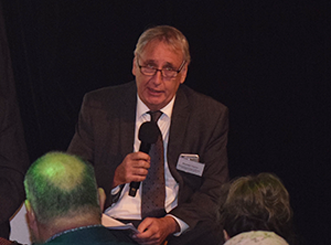 Michael Taylor – National Policy & Projects Manager – Australian Industry Group
Michael Taylor – National Policy & Projects Manager – Australian Industry Group
With technological changes across nearly all industries, regardless of current competencies, increasingly workers will need to reskill throughout their working lives. It has been estimated that some skills need refreshing every two years while others become redundant in a rapidly changing workplace under the influence of the expanding digital economy. In addition, technological change will demand higher levels of literacy and numeracy so there needs to be a significant focus on workplace literacy and numeracy within the framework of lifelong learning.
Lifelong learning applies to all forms of learning whether formal or informal, accredited or non-accredited. Companies need strategies that include a cycle of re-skilling for all categories of workers according to newly introduced technology and processes. This includes learning that applies existing capabilities in new contexts, including different ways to use higher-level soft skills.
Access to lifelong learning does not necessarily mean access to full qualifications, especially to the existing workforce. Rather, the acquisition of new skills and the refreshing of existing skills can be achieved through access to bite size training. The introduction of micro-credentials by education institutions to meet on-demand learning is increasing.
The growing emphasis by education and training sectors now on skills in enquiry, agility, adaptability, creativity and problem solving means we are better able to adapt to new situations and be lifelong learners.
A variety of learning experiences are required and not just those that are campus-based. Work Integrated Learning in the higher education sector and work-based learning in the vocational education and training sector are at the heart of these experiences.
The linkage of lifelong learning to workforce productivity is now essential. A 2014 UNESCO statement makes the direct link between lifelong learning and economic growth and prosperity. Without efforts by government, education and training sectors and companies to normalise cultures of continuous learning in the workplace the Australian economy will not prosper to the extent that is necessary for our future.
(Vale Michael Taylor – a significant contributor to national education and training policy, with a strong commitment to equity and workplace language, literacy and numeracy.)
Included in Categories
With technological changes across nearly all industries, regardless of current competencies, increasingly workers will need to reskill throughout their working lives. It has been estimated that some skills need refreshing every two years while others become redundant in a rapidly changing workplace under the influence of the expanding digital economy. In addition, technological change will demand higher levels of literacy and numeracy so there needs to be a significant focus on workplace literacy and numeracy within the framework of lifelong learning.
Lifelong learning applies to all forms of learning whether formal or informal, accredited or non-accredited. Companies need strategies that include a cycle of re-skilling for all categories of workers according to newly introduced technology and processes. This includes learning that applies existing capabilities in new contexts, including different ways to use higher-level soft skills.
Access to lifelong learning does not necessarily mean access to full qualifications, especially to the existing workforce. Rather, the acquisition of new skills and the refreshing of existing skills can be achieved through access to bite size training. The introduction of micro-credentials by education institutions to meet on-demand learning is increasing.
The growing emphasis by education and training sectors now on skills in enquiry, agility, adaptability, creativity and problem solving means we are better able to adapt to new situations and be lifelong learners.
A variety of learning experiences are required and not just those that are campus-based. Work Integrated Learning in the higher education sector and work-based learning in the vocational education and training sector are at the heart of these experiences.
The linkage of lifelong learning to workforce productivity is now essential. A 2014 UNESCO statement makes the direct link between lifelong learning and economic growth and prosperity. Without efforts by government, education and training sectors and companies to normalise cultures of continuous learning in the workplace the Australian economy will not prosper to the extent that is necessary for our future.
(Vale Michael Taylor – a significant contributor to national education and training policy, with a strong commitment to equity and workplace language, literacy and numeracy.)
Included in Categories